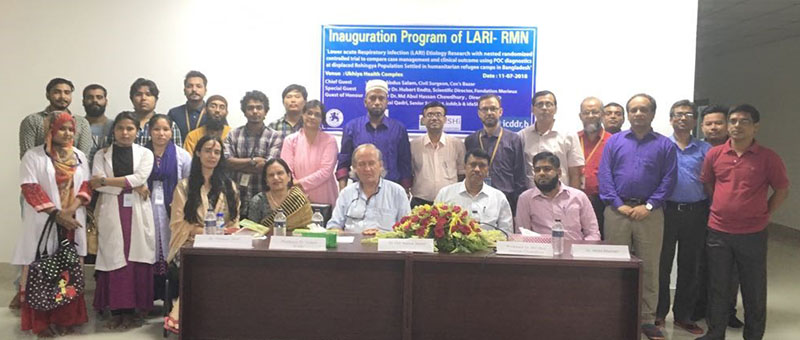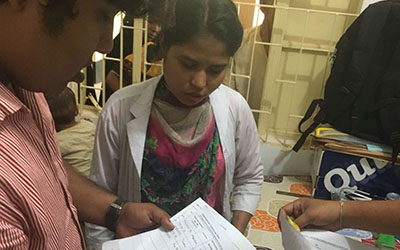
The study was launched at the Rohingya refugee camp located at the Ukhia upazila of Cox’s Bazar district, at an official ceremony with the study’s partners: Bangladesh’s Ministry of Health and Family Welfare, represented by Dr. Abdul Mannan, the Institute for developing Science and Health initiatives (IdeSHi) and the International Centre for Diarrhoeal Disease Research, Bangladesh (icddr,b), represented by Dr. Firdausi Quadri, the Bangladesh Institute of Tropical and Infectious Diseases (BITID) and the Rodolphe Mérieux Laboratory (LRM) of Chittagong, represented by Prof. Hassan Chowdhurry, and the Mérieux Foundation, represented by Prof. Hubert Endtz and Dr. Valentina Picot.
Population density, malnutrition, inadequate vaccination, poor sanitation and hygiene conditions increase the vulnerability of children to infectious diseases, including pneumonia, which is among the leading causes of death in children under 5. The number of Rohingyas who have fled from Myanmar into Bangladesh, combined with the vulnerable populations in the local communities, have reached a staggering 1.2 million, of which 720,000 (about 60%) are children.
In the refugee camps, patient care is guided only by clinical signs in the absence of any access to diagnostic laboratory testing. It is urgent to understand the etiological pathogens at the onset of Lower Acute Respiratory Infections (LARI) in this setting and to provide means for improved diagnosis so that measures can be taken, such as vaccination and appropriate treatment protocols, to prevent their spread and reduce morbidity and mortality. It is particularly important for guiding antibiotic prescriptions and reducing antibiotic resistance.
The new study, which is designed and overseen by the Mérieux Foundation, aims to:
- estimate the proportion of LARI attributable to specific viral and bacterial pathogens, including those that are vaccine preventable,
- evaluate the performance and impact of a rapid point-of-care (POC) diagnostic toolkit in an emergency situation during a humanitarian crisis,
- identify serotype distribution of Streptococcus pneumoniae to estimate the potential serotype coverage of pneumococcal conjugate vaccines (PCV),
- provide emergency laboratory support to improve the management of respiratory tract infections,
- assess putative risk factors for infection and/or disease.

It is a multi-center, case-control study with a nested Randomized Controlled Trial (RCT) to identify the pathogens at the onset of lower respiratory infections and to compare case management and clinical outcome using POC diagnostics, in the context of humanitarian crisis.
Samples will be collected from 600 cases and 600 controls in the following age categories: 2 months-4 years, 5-17 years, 18-49 years and ≥50 years. Recruitment completion is expected to end in June 2019.
Several primary health care units at the Rohingya refugee camp are recruiting study participants: Kutupalang UNHCUR, Kutupalang MSF, Ukhia Health Complex and the Balukhali Primary Health Care Centre.
About the Rodolphe Mérieux Laboratory of Chittagong
The site of the Rohingya humanitarian crisis is near Chittagong, where the Mérieux Foundation built a Rodolphe Mérieux Laboratory, with support from Fondation Christophe et Rodolphe Mérieux, to enhance local applied research capacities. Created in 2015, the Rodolphe Mérieux Laboratory is a center of excellence for applied research, training and clinical diagnosis that belongs to the Bangladesh Institute of Tropical and Infectious Diseases. The research center features biocontainment BSL2 and BSL3 laboratories and conducts studies on local public health challenges such as tuberculosis and typhoid, working closely with the International Centre for Diarrhoeal Disease Research of Bangladesh.
The Rodolphe Mérieux Laboratory of Chittagong is an active member of the Mérieux Foundation’s GABRIEL international scientific network.
